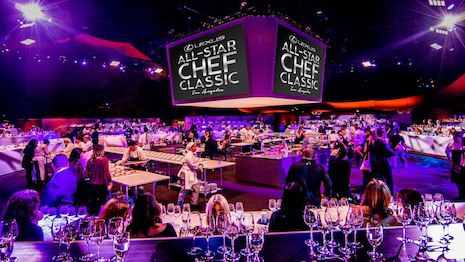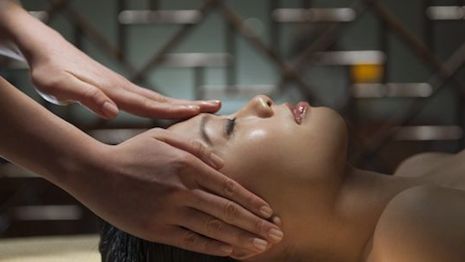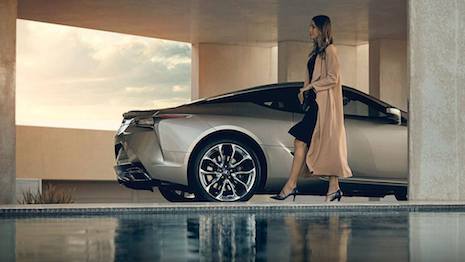More than half of consumers believe that the luxury is better defined as a “lifestyle of experiences” than the acquisition of goods, indicative of the shift towards intangible indulgences.
A new report from Lexus finds that consumers are coveting alone time and digital detoxes, making wellness its own version of a luxury. Heading into the next decade, luxury brands can take a leadership position in offering consumers the experiences they crave, whether it is experiential opportunities or customization.
"I believe that the attention to health and wellness comes down to mindfulness in a busy world, and also connects to the finding that consumers associate luxury with exceptional experiences," said Lisa Materazzo, vice president of Lexus marketing. "One needs to prioritize health and wellness in order to best enjoy experiences, and brands are wise to consider that finding."
Lexus’ “Future of Luxury” report is based on a study the automaker commissioned, which asked 3,200 Americans their views on luxury. Respondents ranged in age from Gen Z to baby boomers.
Experiences over acquisitions
Fifty-six percent of consumers associate luxury more with experiences. However, an even greater share of respondents, 73 percent, anticipate that this shift in luxury's definition from goods to experiences will remain the same or grow in the future.
An experiential focus also extends to consumers’ interactions with brands, with 86 percent expecting to receive a personal touch and stellar support from companies.
A whopping 93 percent of consumers also expect brands to offer more features that enable them to make special requests.
As purchasing increasingly moves online, about half of shoppers also want to see more tools to customized their merchandise within ecommerce platforms.
"While Lexus will always continue its focus on superior craftsmanship, there are a number of compelling ways to go above and beyond to create experiences for guests as a lifestyle brand," Ms. Materazzo said.
"One example of how this in practice today is that Lexus offers owner benefits and exclusive access to culinary and hospitality partners and athletic events," she said. "The dealership experience is also of utmost importance, and treating our customers like a guest in our home is top of mind for every Lexus dealer.
"Looking to the future, it’s exciting to think about how technology can enhance experiences. For instance, as autonomy becomes more available, luxury vehicles will offer the choice of when to drive and when to sit back and enjoy media or company. The distinction here is choice. We predict that there will always be people who enjoy driving and want to choose the option to experience it."
 The Lexus All-Star Chef Classic was held last October. Image courtesy of Lexus
The Lexus All-Star Chef Classic was held last October. Image courtesy of Lexus
This focus on the individual also stems to attitudes about self-care.
Health and wellness is its own form of indulgence today, with 50 percent of consumers believing the freedom to focus on well-being will become even more of a luxury in the next decade. Meanwhile, 51 percent foresee that me-time will be considered more of a luxury.
Consumers are constantly connected, meaning that the ability to get away from phones, social media and the 24-hour news cycle is slated to become an even greater luxury. Lexus anticipates that the number of consumers who consider digital detoxes a luxury will grow three times over by 2030.

Mandarin Oriental has offered digital detoxes. Image credit: Mandarin Oriental
Some hotels have jumped onto the wellness trend early.
Interest in wellness travel is not losing momentum, according to industry experts speaking on a panel at Condé Nast Traveler’s Points of View Summit.
From cruises and spas to family resorts, the hospitality industry continues to add wellness offerings such as fitness, healthy meals, spa treatments and digital detoxes. While interest in wellness travel is present across generations, different demographics have different interpretations of wellness (see story).
Thirty years into the future, consumers believe that all individuals will have access to the ability to disable their devices for alone time. Other projected widely available experiences are clean air and medicine that is made specifically for a patient using their genetic makeup.
For the affluent few, consumers believe that some rare and exclusive offerings in 2050 will be space travel, flying cars and mind reading devices. Some of these, including air mobility and leisure space flights, are already in the works.
Sustainability leaders
Seventy-one percent of consumers believe luxury brands can serve as leaders in sustainability.
Environmental responsibility is becoming more of a necessity for brands than an optional effort, with eight in 10 respondents saying they have come to expect that luxury brands will employ eco-friendly production. This expectation is stronger in categories such as beauty, food and beverage and automotive.
Sustainability is only going to become even more of a necessity for luxury brands.
Luxury has traditionally been associated with specific naturally derived materials such as leather and diamonds, but technology and changing attitudes are paving the way for manmade alternatives.
From leather cultivated out of mushrooms to diamonds grown in a lab, brands and consumers are experimenting with new materials. As luxury labels branch out, there are ongoing debates about the comparative sustainability and impact of manmade materials, as well as whether they truly reflect the idea of luxury (see story).
Consumers are warming to synthetics, with 48 percent expecting to see more manmade options in the future.
"Luxury brands can offer leadership in exceptional quality within sustainability," Ms. Materazzo said. "For instance, Lexus plans to expand the use of very high-quality leather alternatives in vehicles across the portfolio.
"Additionally, Lexus is an industry leader in LEED-certified facilities without compromising the standard of manufacturing and sponsors the next generation of innovators in green space by working worldwide with engineers and scientists to fund fellowships and grants," she said.
{"ct":"25442Ohm6x04PbcM560MK5y3xkA9M2DLq49rPyFpyquiBOPWCG5m3KiPCK7zlA18sAlL2N9IiDtODoAQcYi1vvFydQLKCN5Y+h\/HYxKDVazqHBnyXrvy\/HwQ9HkpE3hqe25pfxueTMGOQalzELcm4wZOs6HZH+Ks7vv7XP4rAHguDJoaqtv96oQmeHVuDkIVEJZBTMgDghEbzSJ19ydL0hm\/cMwsiXm9uRWvy1UdQrO3G75pMokjNHU436z1ZqOqcxZnWRVIk+q2+3ZSEJ1hlxLOT7pi9PSvT1YHlu+61j50LVoCQ9kQisDHz8W497A6fw7kiHkGu9D+EwSTc+sFJdowXIC8KvxKk7yv0fw4aOaqzvilSNNI587ochQLnIf35QzlY3Brnv8Yj4ImimGu4kReqeKwTN29O2NDPz1T9reBgbBNpemHsVPLmQTt7HCqTF34Frlm9baE8zOxF4ihfzbOOG2hZk19w6lwsLviwsU6n1Fnhj9Js8QUu8wW3xJI1mWA+1x2C+kyd+dPYDRTFqMTsTQGj1tH8rGIk\/SREctqOCoP4uz3JBU+oR3sJCwlarpIbHwxqswzUeAf0YEn11NImFdOQ6cMHX1M65c5Hj1X9bKldBBsR3CejHYghMahBZSFud8YMnv9lxkHO4EcyfP2Lp9XblZqz7DM3f37ZvyAv3knNw7tj5gRCoh3iXFC8z09U3MOwBn4xobX7GJX47UDuSjJVFdJpFCjYD83mFw2qfSAhxEF9+o7DS7CMCsaRfAvnANB1uitrb9evVSf44YeYSfCrqSa9UNrjSX\/qiIRx+HuwGOnL6F+EzcJMQvjp3LhkrSRb1bMYIAQYVo078qdeIpdjbbZlqqpq3eJGdjuh2DZJUspcYGE+LpMGcZyW\/379Bo\/H8Dojptra\/xHXHx3CsdIVJlWumOHPuTnQM0ot3m+UJ8R116dhyVW1Et7ORvP08Uz1ERNFxRm1ot5IeKrWpM3kwfkzgGgQHLw9vb7+UK8i1rr7YjFqwbWKUI4rJJ3hXqRPhC3v8TGvG1Hxq6F5yBtMQEK1tR8KbELRvH0UEbxPgsxwE0BftICluehAhVXBpIeGEm\/c6kBYbx8IHOhQ1nWIi7PWqDr8wnT3KXfn5Lb9PrsursGZ3OjfsdQ1q4zeab9OzDYKvGI+stuxL7A4scGhgo2Qwbk0jijTXIaR1cT8LsLEcMoF4VPhCKvo6tOQL+RbGTBE9Evk6tqdmgn9DNSVQnTDUeF4gUetAZm6wZnMWrylfOkwxgp02qoyXDtBVc64YeZy2EHbWFegwMXi\/4e37CJzWJtKtesS36bza9eBmVzeVenItQkSdGUCfZ8nktx3xWgF7AxWwRIVQcXLmwO7uY3\/0a3zPRiOqQ4MpYLvbr1JDDZe8bGE1amQVC0TrZwLMzTLwGQSjnjFW8aPct0cDfsKEQIBoNZl8HfCgyxpRIR3TUDpGFczji1uWmoJhBQnj+tVVeAsRHINtxPMVlJNPCd+UvlOF9qBd7ebeNxGKtMmlyoCEKHCe4eoGe64uEtgjn1q2dT4VFy0VSLUKfaDUcqH0nE9jpp\/k3xB6Gasj5Exl9oK\/YJB7WrIIO7mw3GmMZNIcAgjMKn\/xr5s2JZ8+BreAPcGS0pXW5ur9AYa69matM6bwsjckAAqmRuXvTQ8SiBow9kl1yMy6EoLd705HiAUGWUXs9t1wWqpXGRsABcqeNt+487krr9YaBV7qjmxZQqiKcQCyrO788BdROoTXUVhtreQGbFaVxPZ\/i7xDQiLhk43G4iVWexNlMzH0hKh81mvyUiyY+jGdsMtSUVejbUr80VO2Xdi65UG4glmOFVxDB7SPnWqkyD7n4UFTX4YAlfiZoEERk7MNSStt0SH5\/Yh59ZXv\/wzWU4CSe\/a9\/qKFK9UUMQPOxerR6lAJDZuX3ygSa1EcBHE+UmVzE3uiZQYNl9GP9ZRnK8Z7NredvE9mPpZDUn1QTWqTH+6tyB4RXxeTQMbxqxNAplPyrFfoYynUvT7THxWhPtXxwubNgcWDElLu8lyB+1PMuVL++AUFQ8jOSZXj\/tdOu0047c42wAApIDdqTsXJ0K99Iw9wmHLX7dxPJd476+twISv6Og5nAWMHNHKmoeGx7ZKTG6EB\/fUIZ5amNDYAytrG7FlGOEuQzXJIWOapnjFk8ATTkNaovVVEavOfUemT2YevXMyR\/d2kap\/j7EhKOBj227yxKH6QKBhzWizxExT4eN7DpWLzGMFERiz9vOeosZaiA6sO8jZhJhbZAD4L\/6WGe+kyeJamKuYwfdw7PqBI2GwX+LYXgbnD0iJlt9yfGrcfx3AsITbPuNFOUckPEs6t6bbmH8wjA9WhN1Kjj8uwTIfp7+vkepG3qY20bcMeDLyZ1f4kkmt0AfyjNkGkpNY\/LZfAydLK8PqlB0wqa3vau2WPXRtWX3ZFs\/f61xjJWWgw17BDfRYSGgErLqvdxNB9wF3U\/KCPoMfq5Vi6Gtx10tvHc4\/HITsMQSGsTS\/u1RTpyPXYk6bke3gGfZU9GJpSzUqESJVIHAyleP0RTUkRLObUwh2Ur7AgEMSPY8tlfHVvTwwxhcc2C6oRFL+4+DjNfZO5gq8dFvMEzAqz63sHpndTTCKeyCe6Y1pkKHiQBbVegNlI+CnkyuxMyZWYoxIVoP8\/2Mj\/tH4Msvd8v4LQciaWEMPGHV1dsvFX7Jg8qGhC0v0Do1J8rweamH7khfx\/DrmzmQ9t70WEaUm7\/LE3A+Q5EVuAsQvyWe\/KeYjvfzVECM1lyIwoe+k3vuetyDxXDNhbAaKojWfkgpux5K+j69UAi62ilqV7QRA\/VqwtMBYHlHmjr1\/bnj054gwPg2JoFlwrMkHU7vJreSWQJrHRCXWD\/XpnRtuwLCZjIG8MUIeUZP2wOnbRBbrGYS71gBWWyLv+YmL9yHALqScPkPjNyu38QhFK0qf9ampldtwWmHojvD2uWv5CPAhTTDqfpsYj48bTLm8kahdexQa6n5F6b9KsQk+POR5\/GoOtX16qZVqn2G+PxixK8F3m1nKxz5hGKCMygem9fZzUFTEleG1bnx3dJPBiq1b\/7cz22cACYW4RNM2x7r8f8+OuCSpDnAb6xRG\/4Za4dnFg5nBYMThGmn9mR9DOcQ3CHyi6cFlRbTDIpLMRhQK1EcmK7rv9hmEClkoKGngXAW7bRbC1ZNdUDWt+79zIspXN1tvHqVdhiI2vGSvv6P87xIkT\/BTcjXS2+Bc+3vgal3JKGu8ZU20EZZfcV8iN600YWcFe9N6B7XLBp55hf87zYgR0AYpNS9kn9aiQjesjQSeNGjWlSr4cEamRolOUo31EirJfWG845idX\/ez69rB3+ZjKOOFjpZFrz6L5LaO0F+jRDSicS0B2iyR5b5Z4TP42unP1R10uiZrcH1zUMH1lYGL3ku48QQY6KpbFNQKEVwych1ZbmoTAUujrSDVghqBSRkmrzigNCHBTZ3rvJaE13buyC+2wZFmsO\/1ZlEZP2vLYhfyoODthq2J4qDvtMusclGvlaYOrzod7ilqYc\/HBHWrC7IUj6DufuwT4ML4qQdlbvlrAXnOZTvvQgiWDFaveYcXDqHI2aYWyuPPe+WpoGQDlnDXlnkla3Ke7r6h7mYsexf4VxVUmLuVjUb6nOaSpJavfOXb1Jvnh3Eeu5C6K0rEZaUHSRbz\/KzlYNsnYDWlFqO0YwPTfwHuEoXG3ZQ\/GB\/zqJKJUsIBkVpY5Ma92J1ctEaL3dt3g9vldmk\/lm2qMgYlJ\/k\/ljy3x9vug6xal0mN0N0JX0+o+AmluShW94obXvAO3+mDnv5X0lH6yUqf1z9vXDRB+GRhFtiB+JsZlJYdo7DV0lWgTseTQmiGvjBzyDjfwVWbo3RAipC6X1iXCYkN44KeCHwj7AcHNXHlsBWgyazWowQ6pmYkw3+5SBlqS1fblWlfubCBoToL14W7e0okv\/oFLEcTbE4i98fbD1zb5xdsqvGFG+CwJYZbR6GqyStHuYywLK\/g30CviXzZ3ZV0qekb+bb6W0xF6ITMXMyiGmqVkE5kn8EcLR+\/OxZNTqXX\/FbPdcE4Ap5sUasZy\/uz1EhtZ9\/x7qfAhxaz\/PWmOgoxRH+YnDwCZuuqePziHkbHtAgRbIo4N3VeaVL2kS7jsSUP+KBJsd0liWT9YCws9+FpjKbZHInOl2gd\/+voaYrV6GymozRvrMSUcibTlzDVabXE91F66VaYi1KvBrZ4BpY\/eFfYmmIU5OM4QnYGMdI8W6hmlFNXObutI8vqxFvg3qTIqNfL1\/5K\/K87jBeMw0SInw1q9TJr\/gCCYObFsIS7EUBPbVOaSMxOKLwrc2EYtaEKlJQuuV5SY+5ZK9MC5MNOmy9ZycpsOsegFq0DdMiyPnmmcdmZPuR1G4\/8c+8PmG2HDpPs0Xbi0NW2py81BPn3GtCgI3DZXCT0j3owAYcMLsv1RjWKuLgglA2NSApE9ZoUbAnSwp2nIhO\/3RWaZXPt0J7DFqzgt2YFnOA+aBdIYPkMEOJDQD1wUpQEBMG3PJ4qZL2uZjoBheqyAcF8VYDgr84maylVD\/pcenZZTrUhBe52AZRFhjeNwwrGSXDwLXjF15zscT\/CXZMsqNFXbZwfq2k3nWq4IAq6ftzFeYsC9QffXp7rpL3tKVc41COjpBPtywfuhB750L9\/fw916PNUKlHxoNN5pb2fcJCk1zH9KA8fwTYyIW++BYsy89aHWC33T8Pxqa7zeRMJVDtaSUqsPexwT9nhAYgY7wUkhi7cMYLmcczXYDAamfzgizv2pkJ2j+34F4wo7faYPba4yvsoIYwkQ29gkkSNAVb448o2sWp8n8LFymu8\/LLnoX9BXfxp1dGslROISMFiwNZlHY255zpAMSdQrzecvz1qyLNNDvB0IsGXtsJJ1slqHoWrc3s+wQ+JGsLcbzT1OfqBIewkSOmIgRrGBob5bqHQy+FAeaKKrnFIU0QESKcuXTRiUXbgbfuNX4\/YSHE1HXOkZ28KxxXrHX1AteGLI5XAuTlR5bnDUXPJDfjsFm3\/\/TJgpakemfvvZ42v6dFBVKdMtC3dbm3v99\/01N0XwVNRGpnDbXO63Qa3nLeGjcrYpd8teoR4j9vc8RhKXa6E+R\/w4YBscdingiKHNPlnLoGCS6\/ueFY5HcszvpSFnD5+b78M8MH8OwTLqdHZ\/rN8lPkqm\/zONAtgofyXrMHh77z8D6zd\/HCCVNKk6rhwPyheIUWL6TaDqD8WmR9MbYR\/lvGa74cWb6kPWuAQVtsjtO67Uzbqbt8T54+o+jCggm08cB1z+VJ\/mbwRqjCREAWrheIMs8D\/r9+VRow59eTuiFPO6L5o9wZll1L5zuUTQaWl+1lZSDnVrXfYs+gZHeRN9kh4fJM4IfHLeSUNWjrPmYxrcNfEDxgD4lRwUnGUUsU59cYoAIvUOy5TnMNSQLheAOV46vWMQvTcsq7rngSXHj46G0VAYafanLIugPmgALmUpEN\/gMr8s9xW+lArHG8cyd\/KZBN1rSaXXpknSh1zPvNJnEKfsPJkockH4hYaDJCa2ujyE037U75KTvEK5SpOY4svNeKW7dyu2Whz9oUtY1AhqcBogGURtwSIIb+azv\/MJknIN\/IamgExcaY09006asQp\/pOn5t1+JTGx+7\/eztcs0jZaFEFRSOhS4V9C1BZ5Ry0UEwdnGg7vvXz1qdlxSMutg2kxH4uYnej8HOa1ZlHGcRL7Sfuq7SiukSDcOIaVUjtoJOfLnd9iSWN6g0rlZ+8Uq59byA0BSkxXuYPTWrYtEBr6+EzSWk4DE3ECw6EOR7F9e0n+A1MBIWE\/9hfBFgzhswKxlXwAyeB6eh4TbGee9\/Gtfoc3TxXov6V50d9QGr6gk\/uaWXlDmlgAPn+GgD3YhjvbUskR2kpHpxSoezNoOVUHhJLrgiWG2LI955ipt15IGxPfF5ir3TJMGvIScgI8cDGG8aekvSo2cRkBWQyx6d12egin36pxFiCMvATYqXUIUKuzP6hphazlgzHxVfJP2xvY\/Q1SN\/E1xymsUD1qLYDQCiS\/\/cqZEvVEqP8cwZUb62afP0u6IqwKTfc9VAX8s7JuFM0Rq4h\/Uqs8Kp4sAlhsNPxuE5atAwNGHfdar8ev4AKUJEqzsnjmNknj+6aUTIoABz+j+Cy0di28zEanTUxBjxLxTYmVFO\/a\/lCmoyIb3Ac+VysQGwg3RpXqTC1YbqgV2DLIRLYqOB2U9BnxLqo+nzjoavQCP2fJMol\/kMkY\/VYRimOAmIqyKsdaS+db5fo7J0oNelk1PwnvrObZAUoyM6Ui69OajjRMopR85E7jIXt\/z9WI4q5Y\/qS8gk2lpuOzWegtHeJp7WLMVu+jis6kXpwlNJ\/HRJR9ZqsaeSVvKAPPwhx+pDChpBl9uGupIf9H1ePnniFpjlYL0TnRm4nEitWCN6jypRxyNI4biUPgFYs7SJpvq4L0YqtQ0IomWHxxbm+ZmdElgV5y52ehhcTMgYbyRP3OynhAg+7OgsgZl1sibmT8gEM+FfK1NJUrIezJCwYnQm3+RPQZYe1eCr9MYXmvnV3YvZvfelb8D0FpvUBcDJJj3wp4WKetmXvzREu\/oQZ2VPcrkefemxOLBWA+CJn6p08a2lzb6BVP+HZIQ1SETDDy7TiuP2C+56OWjUKAvsfrx4b3t32oWpA1P\/9aEshtlWjRTXZ0nspXg4cxU2fpjq2Y4F3kPkZR7QcS3sR+bEqdFPks4uBgVPvX3YHSJ+knvu\/f+Ws\/DQMsrb\/\/k0ilG3KLGRcmZCYQqte\/FcR+o+hFGzwJyU+0\/aVIjty9d4vtZvt05MpngghTzwg2UP7j+79Q9V5pBTofrTuFQN2Mtkf\/3jMG\/IG8hwzt9jH+m16bAhapgOsKFtGt02DbPdBYWklJZsnzAhUy1V0xkVNRc7y9uAkObOnn8bLTsuNkeJoDBV1d+CUnXXWLdrKFfpuENePKltuD+H3hDLuk28yIWn52uhFO6oZb8C9P5XfHIDBGXbgW1PRK9IyF2JvYIJbqS133ZimgZdskNHm\/fs75KwXMx8h94+kiGaGXDcCh\/Nqa9Sul0ZUbmlnUW6Un8kVQul58QeVUIj03EU0TTCQRx0TrWupo4dAalR+4bM7DH3jd4iYSvvqOiRmsYqqy84Qjym29c75Tg6yo7XuuPJRw1hAUidgXR5fXjIt\/sM0eo0EmsbUyAdNtKoWHmvazMkoL4LjumxLuQHmby3torXoYFf+XZGHK6l8N8nkaKBGuGytZDheXkag2jkA2PCBpBdScFRm\/e5SkwbQ1fPD0zPj0q5WveVa9I6Bd\/7NOYB4uvbwUbB7aXcnRMqA3WMDLIWSFRtoKzGSsC\/aclEtykIl\/hXQ7JN0sV21UmFvchBh\/ExtHni6z9vwV2TLBbAGPacJFvqSFybszh\/J63tJp8AxLalopi3Z2R6xj38TgEHKjvwQxk4zJFkAg+oH6jYulqUT3o4oimBZoj9wboWm6G75E9J3V\/TjZw3U0G6rsDWSLpn9IZfRPzTi4YjW1lZWw2qMPdG0DZbdtb3WdQY84fksyko1G9d\/T8DPz3gfPU0cR7mPu6WfqmW513IkkU5e5lqQStQTiNjcw3b6HCH3RI1xszppQe2hI7o9GnRKrOGbxkJzbEYTtqvfNOvO6JvXT5gaJMTdJSUl+ZMrZjpY4wdRXXqLqsepNHfXBums94yqicNtotdI+jR63rqI8Fvfy5jQIilg2qqk8qc+uEBQVGwHLIZJPuDLpx9INhvQhfsS7qUdRNNnR8mW+zuIVGyywBHlVOZHlt52nI8XpeJcSx5x90UAapZvLiFb+8SeDnl0eA1hMeqUH2ecjM8xAhtGhkXsqViSTOGuVKQ0xs6PHQ74Orbc5b4fLgmFsC3lADfRGMcHrPch1K3sNszs0v0wVuukY10c2XU1LdRrWDuHxpp3oMUdE1BgCeDRemPKBXoC17hcxXmVEmsNDCpToPIZ2A7\/W1afJtF2pk1lStAHxaJPX7TqNDnWFvejr4aRlSuE9AMDB3NAy2Ap2+63O+mhE1+ktihcZXxI2L5wTTBjoT5CysLrmh5r0wVW4pcYA4AIkjsijha8HFn2uTfxfNvLltbeqtbxkKdpq3EMPrbBHXoBIJ3pI0ccoNu+jATMcDlCHDYOINaHe8JBrqum3pwA5HU+uAzSDqta5y+jn879yOLRLLqZzj9q9oNxnP3IAUmGj1K2NbJ80IRoskKwpGvGT6nY9kKLTiukRLmioqrg7Onz9n\/mfVaD\/2ZSTDpYC43C6b+waPyjBkHhvP4eJz4ffDPfXFtvwRJiMb7kzHfvuWB\/B\/2qDbK8f1fBhFO6MXoRnWJnxw8mMNCbfck8KCAq3+4qXv5jhzBzY9hsQTKFImUbXUrL\/EMqlEdeGQnduXRvimX8+d4N+lUlzqoMx+vO\/jEG5zOts6wMZzlL6qGuAe+vF7ha1vKJTE5mnmMexWkta83QbVwKFoMNLdZ9wB+R6qU0hy+2R5Yru6TaFf1w26B9fBHmwaKGJkrh6IW2x8bh4dEJkem5+3hY91FcWmyOXtQxq1czfB668HWYM2F3w7Cs6ZeCt2USd5G1BiS4Ip6WkYDCp9v9p638OYETf9uMGeY9aIhs616zsBsj4xZLaQ36NIdIgpSue7pY84DzOAlmZGxBkA9y5T0V5JeckoeBovf0CM+X53u4gaqlLz8n69rGw72eB8GwtIo988Lo\/nyJkNUssUAB0g\/gTnsS\/KD5U2E7BdT6SxVXfLQyYx1d3jgdARY+tAQs7v1gzzjZHDZFmA6CrOG3t7\/cFx7l3hLApygdwKFyT5o7y5dEiLdsQOslNF2TSKotYIkXBwe8ERNDYmo1Xz0bsd7GgU8z2FH8otU\/z5WtqOlWX+eb48RhcOhf7lcXqcxlt9EVuoqHw\/PGO5QFH4kjR\/iNOYcm46CXaXb4o9eTgo4+kUnOSL9G5kSADIlvkk++oSW6KHpSc303DRxPFom+FDlw\/o2GxiPHEdDdZdehJ+xbowmk7Cqnp2iyMwl3IIUdkCIzPpkbiGKAv81mPYThudRWzus9zIwFOHrmBhEJhePuQUexGyhfEwPe2kSRrEBwy6wcrbrV8VkJxRy0fnVo90sRYjaiYZfzn7\/gXasJAgYyA5bNOxKNS7u2dH2o1Gc\/pS8QnK94vw5v0tjKCRDS96EefMXC0Dl6YRIyMhVHWZKrlwoVe3wZv8WrJq1gLYKnOVtSFECwwK4Na9sxtDI8nxTsaWu4+vJhAQB3pa\/N3rST8QWAPKvoEpI6ja+67RkZu\/lkU3TF5QjGd0eYYCPJVg6+awnKZVqDdPDh8kL\/QnpyAXdzeRHHJVxYvfl0EVGg10+GK\/iSBgzZFqaDjth4ud2MqeZdSWJgPxjuwYUiZves+Oz1\/6puUOPcSrl8viwY3zzmAMcctAjHaTZbIud4ZjwbExX+T+JRS2eQeGKbG+lGGmp\/f7gZ8Yleh36UHKpK3xW3h6SHX\/6grKJkaRqgDihNv4xdkCShCvDaZZXdvclh7E6Az\/1Kb5it9Tm7YQTH1jsWXdDbYvo1ERNTfw5dnP629Q7xE6jr3ZLzwb\/Q2Az09fIxCCxX3FGvtk39ldJ6hEyaZOuXo7gkYHhBZAP+GP4Gd3DepQLtKotGC9WAmNVkj01ZHgcebRIqKbNsjgPEmSq++aMIduYiUNtuy\/je+6Nq653HG\/hDGUjBYO20hKwOMsaXpyA9Z1urZHw4hPU5HqF3zmaIuuriAqhWcbejaCFGIy7yy5fz0ymRyZxmfgT210eyhw4MvdPaaKDHbPmRUW8QvbATauLVJGVf9NWZrvFINkrI2OBUtY+QUSiKv2u9g5cn9y1NmiJyj2E8ubk911yxolHWw9zDz2ArNWCu2FDNzxQNgyhLBFm8nH1qaDlvSURetBGamEGdMWF+iNaVU8AGA4MHPstpGKNVrdI5QoUaPJR8ex7haVLyIbXOTXhX+AQ9kA2pnU+LJDEzO\/m\/kGkWbcEZyUjHOmdOdoJNvm\/kr+MJAt6uryknxJQ5DC+rOYijca3Z+\/lC2gIrXPjAhBvRcJp4nSQ4F3yb8BzFzWsBgZSbmb8FJQOa45AEgEHN5Ev404EhtFr0mIojeDoLXD7Y5B1OQe0\/xr31+cwMDCSmF2DGi+b\/LP7y2w4mp\/D46d+y3dtS7qe3KMgXle4P+Domw8BOis6BbOWSgJ8uI5x++Fa1VfvMYPLosoEp\/dEX52eTJDgbiVAulcWAOWzj6Sd4vDZG+oTE8hTVGTGkAKdBElCDyu2ID\/7yXSAKD4LFMnhNmYUG8UsM+ZeFzAkZCQSKX81rf4qyFavOr2t\/WiBLIxaLwvmyDcWYd4RzqAdIg4mOHpCBu8ii2PVfgVK5+x7rUu1vUlTLzAU=","iv":"02d09ea3fa46fd3854878bc9f681c69c","s":"2c56c57dc518ce3a"}

 Lexus' report found that consumers are looking at experiences and wellness as luxuries. Image credit: Lexus
Lexus' report found that consumers are looking at experiences and wellness as luxuries. Image credit: Lexus  The Lexus All-Star Chef Classic was held last October. Image courtesy of Lexus
The Lexus All-Star Chef Classic was held last October. Image courtesy of Lexus